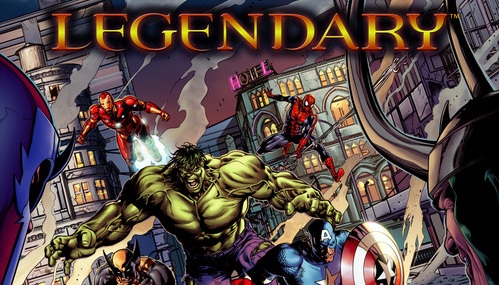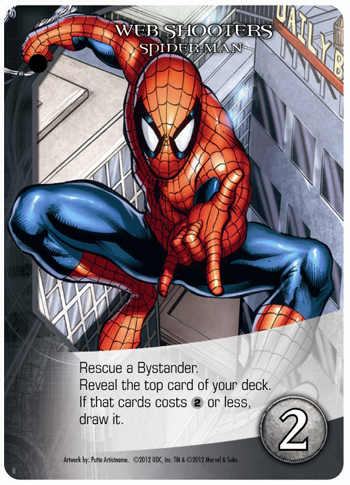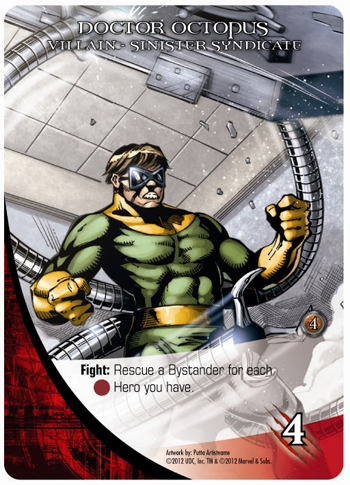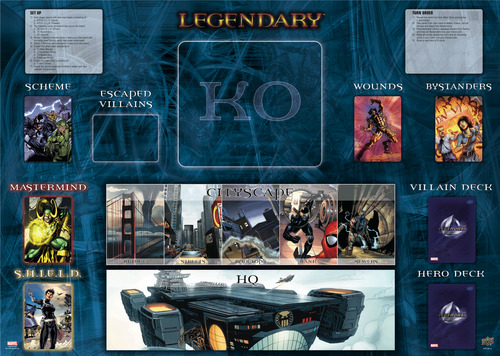

In recent years, the deck building genre of card games has become very popular. Dominion hit the scene in 2008, and was a smash hit. In addition to a host of expansions for that game, many other deck building games have been published. Thunderstone, Ascension, Nightfall, and Rune Age have each tweaked the formula to varying degrees of success. One thing that was missing from the genre, though, was cooperation. The subject of this installment of Tabletop Co-Op, Legendary, introduces Marvel super heroes into the deck building genre, and adds co-op too!
So what exactly is a deck building game? In this type of game, each player starts with a small deck of cards. A pool of other, more powerful cards are available for adding to this starter deck. Cards drawn from the starter deck provide resources, which can be used to obtain better cards, which are then shuffled into the player's deck to be drawn again later. As the game progresses, the quality of the cards in each player's deck improves, allowing them to obtain even better cards, in a shuffling spiral of deck optimization. Win conditions typically involve victory points obtained by purchase, defeating monsters, etc. Despite problems like long setup times and excessive shuffling requirements, the genre has proven to be very successful.


Legendary was just released earlier this month, making it the latest generation of the genre. The mechanics may not be particularly innovative, but they are finely tuned and very thematically implement the super heroic action and villainous foes of the Marvel Universe. A host of heroes, villains, and schemes to choose from during setup means no two games will ever play the same. With the benefit of hindsight, learning from what worked and what didn't in other deck building games, Legendary is the pinnacle of the genre.
The main conflict in the game is the hero deck versus the villain deck. The hero deck contains special cards related to five or six heroes, chosen at the beginning of the game. These cards work basically as the super powers of the various heroes. Spider-Man's webbing, Iron Man's repulsors, Thor's hammer... all of these iconic abilities are available. You'll need to purchase them and add them to your deck to draw on future turns in order to defeat the villain deck.

A mastermind card is chosen, naming the specific big baddie to be fought. The villain deck is then created, including the mastermind's minions as well as other evil opponents like Hydra, Hand ninjas, or Spider-Man's rogues. A scheme card is then drawn, detailing the mastermind's plan, as well as acting as a timer of sorts. When scheme cards are drawn from the villain deck, bad things happen to the players. As the game progresses, the bad guys show up, rampaging through the city. Players use the cards they drafted from the Hero deck to keep the city streets clean, gathering strength over time in order to defeat the mastermind four times, ending the game in a victory. If the mastermind's final scheme card resolves first, however, evil wins!
While players are encouraged to specialize in perhaps two or three hero's power cards, as long as you can afford it, you can purchase any card on your turn. You can have Cyclops, Black Widow, Wolverine, Deadpool, and Nick Fury in your deck if you want. But it might make your deck less optimal to do so. If you limit your choices to a few heroes, your odds of unleashing combos become far higher. Often, these little synergies between cards will make the difference between taking down the mastermind, or having to content yourself with blowing up a lowly Doombot.
If it seems complicated, well... it is. Legendary will be difficult to pick up for gamers who've not played a deck building game before. But the theme of noble super heroes teaming up to take down sinister bad guys makes the basic premise of the game very easy to pick up. After a few plays, even a beginner, or a young player, will understand the best strategies and be able to make a valuable contribution. Since it's a cooperative game, it's far more accessible to new players, who won't get discouraged if they are "out played" by veterans, which can be a problem in competitive deck building games.
Legendary is a fantastic game, easily one of the best deck building games available. Marvel's super heroes are as popular now as they've ever been, and the game implements the special powers and abilities of fifteen different heroes effectively. Turns go by quickly, and a game can be completed in an hour or less, making it a great choice when time is short. Best of all, the cooperative nature of the game promotes interaction and planning with other players, a shortcoming of other deck building games. Legendary is an excellent game, possibly the best I've played this year, and it's certainly worth a look for fans of either comic heroes or deck building games like Dominion.